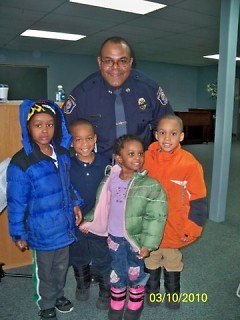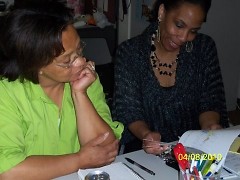Since its inception five years ago, the place-based community strategy, Grand Rapids Weed & Seed is counting its accomplishments in celebration of its fifth year of outreach within the Baxter, Eastown, South East End, Madison Area and East Hills neighborhoods.
Officially launched in June 2004 and now under the direction of Kristine Jaros, the Grand Rapids Weed & Seed is reducing incidents of narcotics-related crime, aggravated assaults and gun-related crime. Weeding efforts have focused on the concerns of the residents, primarily on violent crimes and illegal drug sales, as identified through community meetings. Its “Seeding” work has included increasing opportunities for the youth in the community, raising awareness on the issue of domestic violence and decreasing youth access to alcohol.
According to Captain Eric Payne, Vice Chair of Weed & Seed, “Since 2004, the most violent types, called “Part One” crimes, have decreased 23% in our area. Homicides are down 75%, aggravated assaults are down 34% and robbery is down 25%. “Part Two” crimes have decreased 13%. Vandalism is down 65% and due to targeted efforts, weapon offense arrests are up 68% and narcotic offense arrests are up 58%, which means we are removing guns and illegal drugs from our community.”
The Grand Rapids Central City Weed & Seed began as a collaborative effort between the Department of Justice, The City of Grand Rapids, The Grand Rapids Police Department, Grand Valley State University, and includes partnership with numerous neighborhood-based organizations and concerned residents within their service area. Strong community partnerships have been core for the successes of the Central City Weed & Seed, and according to Jaros, “Together, it's our vision to create a safe, unified and vibrant Southeast Grand Rapids!”
As a program of the Department of Justice, The Central City Weed & Seed has received a commitment of federal funding for five years. The sunset on this funding is coming up this summer, and Jaros is leading her Steering Committee council to develop a sustainability plan so the efforts of Weed & Seed will continue to grow within the urban community.
Grand Valley State University has served as Weed & Seed's fiscal agent and has also hosted the organization's office on their Grand Rapids' campus. Part of the leadership's long-term vision for Central City Weed & Seed includes establishing its offices in the neighborhood that it serves.
According to Jaros, “To be in the community, in the neighborhood, it will allow us to continue our presence and better facilitate partnerships and communication among Southeast Grand Rapids residents, businesses and other stakeholders to improve safety, economic conditions and accessibility to resources.” Jaros goes on to say, “We must be consistent, effective and known in our work, location, staff and leadership. We prioritize supporting residents and organizations in the Weed & Seed Community.”
The leadership is in the process of securing its 501(c)3 nonprofit status, and is putting a call out to the Grand Rapids community to help root and grow the Central City Weed & Seed program past this transition stage. This is an opportunity for community leaders in Grand Rapids to lend a hand and help Weed & Seed establish community partnerships and resources in order to leverage the past 5 years of efforts that have benefited Grand Rapids' urban core. Volunteers are needed in the areas of marketing, resource development and business strategy.
Jaros and her advisory team have a variety of events planned this year, including a community celebration of the past five years' efforts. Details of a celebration are not yet finalized, yet their outreach calendar is available on the website.
Weed & Seed is a community-based multi-agency approach to law enforcement, crime prevention, and neighborhood restoration. Weed & Seed links federal, state and local social services, private sector plus community efforts, to maximize the impact of existing community programs and resources.
The strategy is to "Weed" out drug trafficking, gangs, violent crimes and related offenses through coordinated law enforcement and community policing; and "Seed" the designated areas with prevention, intervention and treatment programs and neighborhood restoration programs designed to meet the communities' needs. For more information on this program or to volunteer, please visit the Weed & Seed website, e-mail Site Director Kristine Jaros at [email protected], or call 616-331-7247.
The Rapidian, a program of the 501(c)3 nonprofit Community Media Center, relies on the community’s support to help cover the cost of training reporters and publishing content.
We need your help.
If each of our readers and content creators who values this community platform help support its creation and maintenance, The Rapidian can continue to educate and facilitate a conversation around issues for years to come.
Please support The Rapidian and make a contribution today.



